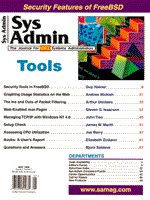
Editor's Forum
Our theme this month is system administration tools, and in that vein I'd like to extend a special thanks to all the authors who have written for us this month, and in the past, sharing the tools that they have developed for various tasks. Some of these tools have been simple, others complex, but they have all provided us with the potential for making our own administrative endeavors a little bit easier. Let's give them all a round of applause and a pat on their virtual backs. I'd also like to extend an invitation to submit your own article to Sys Admin. It's easy. Just check the call for papers in the magazine or on our Web site and see if any of the upcoming topics interest you. If not, choose your own topic or submit a tool that you've developed and would like to share. We'll be glad to hear from you. Developers of freeware distributed via the Net also deserve our thanks. Everyone from the myriad people involved in the Linux effort, to Larry Wall for inventing Perl, and the thousands of individual programmers in between who share their labors with us over the Net. Speaking of Perl, have you looked at O'Reilly's Perl Resource Kit? Definitely not freeware, but it has all the trappings of being a useful information tool. We'll have to wait to see what Elizabeth Zinkann, our not-so-resident book reviewer, has to say about the details inside the hefty O'Reilly box. In the information-as-tool department, we are also trying to do our part. If you have visited our Web site (http://www.samag.com), you know that we have back issues and source code available on the site. We are also working on improving both the interface and the search tools available on the site to make the contents more useful to you. For locally accessible information, our back-issue CD-ROM can also be useful in finding that article you know you read, but can't quite put your finger on. An update is in the works, also with improved indexing and search capabilities. If you are like me, you probably consider UNIX books and CD-ROM resources some of the best tools in your kit. I have found at least a couple of pearls in each of the books I have bought over the years, and it doesn't take too many pearls to offset the cost of the book in terms of time and effort saved. All too often, however, technical book publishers get in the way of the value of the books they publish. How so? By pinching pennies at the end of the book. I speak, of course, of the venerable index, that treasure map that leads us to the pearls of wisdom hiding within the pages. Certainly we would like to have the time to read books cover-to-cover, but we seldom have that luxury. Instead, we tend to skim a couple of chapters and then rely on the ability to find the information when we have a specific question. We then turn to the index and find that the publisher has chosen to provide a six-page index for a 600-page book on a complex technical subject. Most likely, that decision was made to stay within the page budget that was agreed upon before the author got his or her second wind at the keyboard. Bad decision. It is the paper equivalent of poor software design or a marketing decision to rush a not-quite-ready product to market. We fix software problems with patches, service packs, and point releases. Books, however, do not lend themselves to that treatment, so technical book publishers need to do it correctly the first time. Or, they should be nudged into doing so by complaints to the contacts listed on their Web pages. The Web is, after all, the best remote communication tool we've ever had.
Sincerely yours, |